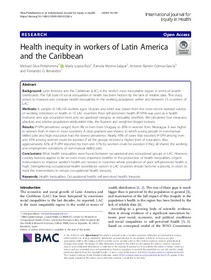Welcome to the UPF Digital Repository
Health inequity in workers of Latin America and the Caribbean
JavaScript is disabled for your browser. Some features of this site may not work without it.
| dc.contributor.author | Silva-Peñaherrera, Michael, 1984- |
| dc.contributor.author | López Ruiz, María, 1982- |
| dc.contributor.author | Merino Salazar, Pamela Alexandra, 1978- |
| dc.contributor.author | Gómez García, Antonio Ramón |
| dc.contributor.author | Benavides, Fernando G. (Fernando García) |
| dc.date.accessioned | 2020-09-16T06:25:23Z |
| dc.date.available | 2020-09-16T06:25:23Z |
| dc.date.issued | 2020 |
| dc.identifier.citation | Silva-Peñaherrera M, Lopez-Ruiz M, Merino-Salazar P, Gómez-García AR, Benavides FG. Health inequity in workers of Latin America and the Caribbean. Int J Equity Health. 2020; 19(1):109. DOI: 10.1186/s12939-020-01228-x |
| dc.identifier.issn | 1475-9276 |
| dc.identifier.uri | http://hdl.handle.net/10230/45293 |
| dc.description.abstract | Background: Latin America and the Caribbean (LAC) is the world's most inequitable region in terms of wealth distribution. The full scale of social inequalities in health has been hidden by the lack of reliable data. This study aimed to measure and compare health inequalities in the working population within and between 15 countries of LAC. Methods: A sample of 180,163 workers aged 18 years and older was drawn from the most recent national surveys of working conditions or health in 15 LAC countries. Poor self-perceived health (P-SPH) was used as a health indicator, and age, education level, and occupational category as inequality stratifiers. We calculated four measures: absolute and relative population-attributable risks, the Kuznets and weighted Keppel indexes. Results: P-SPH prevalence ranged from 9% in men from Uruguay to 50% in women from Nicaragua. It was higher in women than in men in most countries. A clear gradient was shown, in which young people in non-manual skilled jobs and high education had the lowest prevalence. Nearly 45% of cases that reported P-SPH among men and 35% among women could be avoided if all the groups received a higher level of education. Also, approximately 42% of P-SPH reported by men and 31% by women could be avoided if they all shared the working and employment conditions of non-manual skilled jobs. Conclusions: Wide health inequalities were found between occupational and educational groups in LAC. However, country borders appear to be an even more important stratifier in the production of health inequalities. Urgent interventions to improve worker's health are needed in countries where prevalence of poor self-perceived health is high. Strengthening occupational health surveillance system in LAC countries should become a priority, in order to track the interventions to reduce occupational health inequity. |
| dc.format.mimetype | application/pdf |
| dc.language.iso | eng |
| dc.publisher | BioMed Central |
| dc.relation.ispartof | Int J Equity Health. 2020; 19(1):109 |
| dc.rights | © The Author(s). 2020 Open Access This article is licensed under a Creative Commons Attribution 4.0 International License, which permits use, sharing, adaptation, distribution and reproduction in any medium or format, as long as you give appropriate credit to the original author(s) and the source, provide a link to the Creative Commons licence, and indicate if changes were made. The images or other third party material in this article are included in the article's Creative Commons licence, unless indicated otherwise in a credit line to the material. If material is not included in the article's Creative Commons licence and your intended use is not permitted by statutory regulation or exceeds the permitted use, you will need to obtain permission directly from the copyright holder. To view a copy of this licence, visit http://creativecommons.org/licenses/by/4.0/. The Creative Commons Public Domain Dedication waiver (http://creativecommons.org/publicdomain/zero/1.0/) applies to the data made available in this article, unless otherwise stated in a credit line to the data. |
| dc.rights.uri | http://creativecommons.org/licenses/by/4.0/ |
| dc.title | Health inequity in workers of Latin America and the Caribbean |
| dc.type | info:eu-repo/semantics/article |
| dc.identifier.doi | http://dx.doi.org/10.1186/s12939-020-01228-x |
| dc.subject.keyword | Health inequalities |
| dc.subject.keyword | Inequity |
| dc.subject.keyword | Occupational health |
| dc.subject.keyword | Self-perceived health |
| dc.rights.accessRights | info:eu-repo/semantics/openAccess |
| dc.type.version | info:eu-repo/semantics/publishedVersion |


